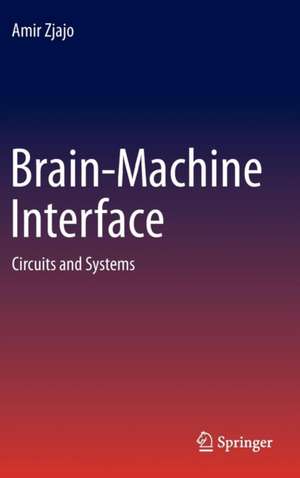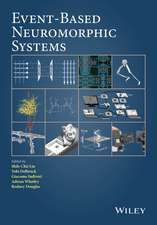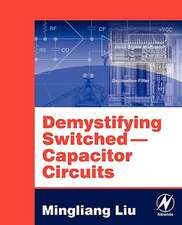Brain-Machine Interface: Circuits and Systems
Autor Amir Zjajoen Limba Engleză Hardback – 8 apr 2016
| Toate formatele și edițiile | Preț | Express |
|---|---|---|
| Paperback (1) | 635.01 lei 43-57 zile | |
| Springer International Publishing – 25 apr 2018 | 635.01 lei 43-57 zile | |
| Hardback (1) | 641.03 lei 43-57 zile | |
| Springer International Publishing – 8 apr 2016 | 641.03 lei 43-57 zile |
Preț: 641.03 lei
Preț vechi: 754.15 lei
-15% Nou
Puncte Express: 962
Preț estimativ în valută:
122.66€ • 128.39$ • 102.09£
122.66€ • 128.39$ • 102.09£
Carte tipărită la comandă
Livrare economică 31 martie-14 aprilie
Preluare comenzi: 021 569.72.76
Specificații
ISBN-13: 9783319315409
ISBN-10: 3319315404
Pagini: 163
Ilustrații: XX, 163 p. 79 illus., 3 illus. in color.
Dimensiuni: 155 x 235 x 13 mm
Greutate: 0.44 kg
Ediția:1st ed. 2016
Editura: Springer International Publishing
Colecția Springer
Locul publicării:Cham, Switzerland
ISBN-10: 3319315404
Pagini: 163
Ilustrații: XX, 163 p. 79 illus., 3 illus. in color.
Dimensiuni: 155 x 235 x 13 mm
Greutate: 0.44 kg
Ediția:1st ed. 2016
Editura: Springer International Publishing
Colecția Springer
Locul publicării:Cham, Switzerland
Cuprins
Introduction.-Neural Signal Conditioning Circuits.- Neural Signal Quantization Circuits.- Neural Signal ClassificationCircuits.- Brain-Machine Interface: System Optimization.- Conclusions and Recommendations.-Appendix.- Index.
Notă biografică
Amir Zjajo received the M.Sc. and DIC degrees from the ImperialCollege London, London, U.K., in 2000 and the PhD. degree from EindhovenUniversity of Technology, Eindhoven, The Netherlands in 2010, all in electricalengineering. In 2000, he joined Philips Research Laboratories as a member ofthe research staff in the Mixed-Signal Circuits and Systems Group. From 2006until 2009, he was with Corporate Research of NXP Semiconductors as a Senior ResearchScientist. In 2009, he joined Delft University of Technology as a facultymember in Circuits and Systems group.
Dr. Zjajo has published more than 70 papers in referenced journalsand conference proceedings, and holds more than 10 US patents or patentpending. He is the author of the books Low-Voltage High-Resolution A/D Converters: Design,Testand Calibration (Springer,2011, Chinese translation, China Machine Press, 2015), and Stochastic Process Variationsin Deep-Submicron CMOS: Circuits and Algorithms (Springer,2014). He serves as amember of Technical Program Committee of IEEE Design, Automation and Test inEurope Conference, IEEE International Symposium on Circuits and Systems, IEEEInternational Symposium on VLSI, IEEE International Symposium on Nanoelectronicand Information Systems, and IEEE International Conference on Embedded ComputerSystems.
His research interests include power-efficient mixed-signalcircuit and system design for health and mobile applications, and neuromorphicelectronic circuits for autonomous cognitive systems. Dr. Zjajo won the bestpaper award at BIODEVICES 2015, and DATE 2012.
Dr. Zjajo has published more than 70 papers in referenced journalsand conference proceedings, and holds more than 10 US patents or patentpending. He is the author of the books Low-Voltage High-Resolution A/D Converters: Design,Testand Calibration (Springer,2011, Chinese translation, China Machine Press, 2015), and Stochastic Process Variationsin Deep-Submicron CMOS: Circuits and Algorithms (Springer,2014). He serves as amember of Technical Program Committee of IEEE Design, Automation and Test inEurope Conference, IEEE International Symposium on Circuits and Systems, IEEEInternational Symposium on VLSI, IEEE International Symposium on Nanoelectronicand Information Systems, and IEEE International Conference on Embedded ComputerSystems.
His research interests include power-efficient mixed-signalcircuit and system design for health and mobile applications, and neuromorphicelectronic circuits for autonomous cognitive systems. Dr. Zjajo won the bestpaper award at BIODEVICES 2015, and DATE 2012.
Textul de pe ultima copertă
This book provides a complete overview of significant design challenges in respect to circuit miniaturization and power reduction of the neural recording system, along with circuit topologies, architecture trends, and (post-silicon) circuit optimization algorithms. The introduced novel circuits for signal conditioning, quantization, and classification, as well as system configurations focus on optimized power-per-area performance, from the spatial resolution (i.e. number of channels), feasible wireless data bandwidth and information quality to the delivered power of implantable system.
Caracteristici
Introduces a novel, low-power analog front-end circuits for signal conditioning and quantization and digital back-end circuits for signal detection and classification in 90-nm and 65-nm CMOS technology Uses numerous examples to demonstrate procedures and system configurations for modeling, analysis and design of brain-machine interface circuits both state-of-the art software and hardware implementations Includes supplementary material: sn.pub/extras











